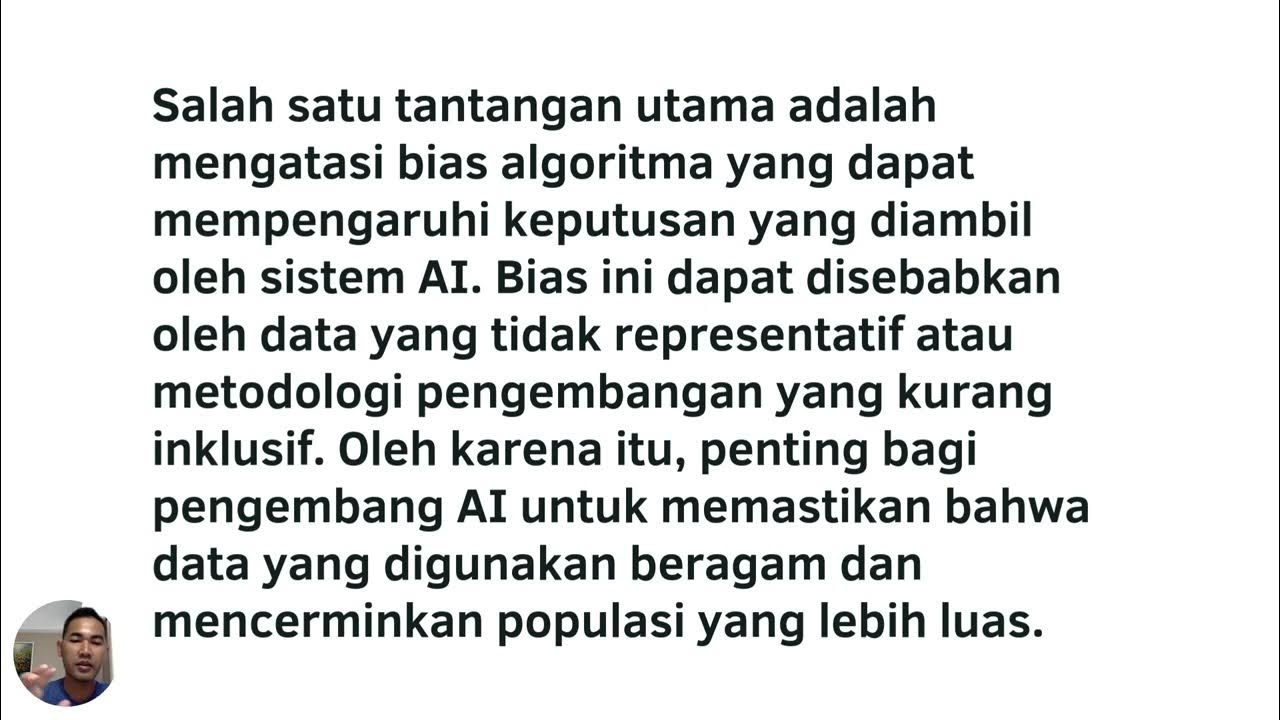Inteligência Artificial Ética e Responsável
Summary
TLDRIn this video, Ederson Almeida discusses the importance of ethical and responsible artificial intelligence (AI). He emphasizes the need for AI systems that are transparent, fair, and beneficial to all, avoiding biases and discrimination. Drawing from his experience as a developer and researcher, Ederson highlights how AI should be designed to enhance human well-being, taking social, cultural, and ethical implications into account. He also mentions various global initiatives focused on AI ethics, including his involvement in the aires.org project, urging viewers to engage in discussions about AI, innovation, and entrepreneurship.
Takeaways
- 😀 AI Ethics and Responsibility focus on creating AI systems that are just, transparent, and respect ethical and societal values.
- 😀 AI systems should maximize human well-being and avoid biases, discrimination, or injustice.
- 😀 AI has the potential to improve lives but also the risk of perpetuating existing prejudices and inequalities.
- 😀 Ethical AI design must consider social, cultural, and ethical implications to ensure systems benefit all without harming specific groups.
- 😀 Data used to train AI systems must be representative and free from bias to ensure fairness.
- 😀 AI systems should be transparent and explainable, enabling users to understand how they work and how decisions are made.
- 😀 To avoid discrimination and prejudice, AI systems should undergo bias testing, critical analysis, and peer review.
- 😀 Ensuring AI benefits all people without exclusion is critical for a fair and just future.
- 😀 There are various research entities worldwide, including in Brazil, Sweden, California, and Porto Alegre, focusing on ethical AI.
- 😀 Ederson Almeida is involved in a project called aires.org, which focuses on ethical AI research.
- 😀 The speaker emphasizes the need to stay informed and engaged in the conversation about AI innovation and ethics, with further content planned on topics like entrepreneurship and AI.
Q & A
What is the main topic of the video?
-The main topic of the video is ethical and responsible artificial intelligence (AI). The speaker discusses what it means, why it is important, and how we can develop AI systems that are ethical.
Why is ethical and responsible AI important?
-Ethical and responsible AI is crucial because AI systems can have significant societal impacts. Without ethical guidelines, AI can perpetuate biases, discrimination, and inequality, which can harm certain groups and undermine trust in the technology.
What does it mean for AI to be ethical and responsible?
-For AI to be ethical and responsible, it must be designed to be fair, transparent, and respectful of social values. This includes ensuring that AI systems promote human well-being and avoid harmful biases, discrimination, or injustice.
What are some examples of AI's potential benefits?
-AI has the potential to improve various aspects of life, such as providing more accurate medical diagnoses and enabling autonomous vehicle driving.
What potential risks does AI pose?
-AI can also perpetuate existing prejudices and inequalities if not developed responsibly. These risks include bias, discrimination, and exacerbating social divides.
How can AI systems be made more ethical?
-AI systems can be made more ethical by ensuring that the data used to train them is representative and unbiased, making systems transparent and explainable, and conducting bias tests and peer reviews.
What role do transparency and explainability play in ethical AI?
-Transparency and explainability are vital for ensuring that AI systems are understandable and accountable. This allows users to see how decisions are made and ensures that the systems operate in a fair and just manner.
What steps can be taken to prevent discrimination in AI systems?
-Preventing discrimination in AI systems can be achieved through bias testing, critical analysis, and peer review processes. These steps help identify and correct potential biases in AI models.
What global efforts are being made to study ethical AI?
-There are several research initiatives worldwide, including in Sweden, California, and Porto Alegre, Brazil. Notable institutions like Stanford and PUC are also involved in ethical AI studies, and the speaker is part of the aires.org project.
What is the speaker's background and involvement in AI?
-The speaker, Ederson Almeida, is a developer and researcher specializing in artificial intelligence. He is currently pursuing a doctorate and is actively involved in research on ethical AI, particularly through the aires.org project.
Outlines

This section is available to paid users only. Please upgrade to access this part.
Upgrade NowMindmap

This section is available to paid users only. Please upgrade to access this part.
Upgrade NowKeywords

This section is available to paid users only. Please upgrade to access this part.
Upgrade NowHighlights

This section is available to paid users only. Please upgrade to access this part.
Upgrade NowTranscripts

This section is available to paid users only. Please upgrade to access this part.
Upgrade NowBrowse More Related Video

Ethics in AI4EO - Applying Ethics to AI4EO

Etika dan Regulasi Penggunaan Kecerdasan Buatan AI Presentation

ARTIFICIAL INTELLIGENCE/ KECERDASAN BUATAN. DAMPAK POSITIF DAN NEGATIF.

Geoffrey Hinton | Will digital intelligence replace biological intelligence?

AI vs Human Intelligence: The Ultimate Comparison!

The Development of Artificial Intelligence Will Help Humanity
5.0 / 5 (0 votes)